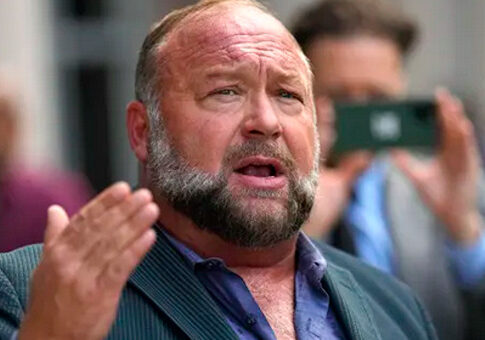Donald Trump’s best line in the September debate against Vice President Kamala Harris came near the end, when he sought to tie her to the unpopular president under whom she serves.
“She just started by saying she’s going to do this, she’s going to do that, she’s going to do all these wonderful things,” Trump said. “Why hasn’t she done it? She’s been there for three and a half years. They’ve had three and a half years to fix the border. They’ve had three and a half years to create jobs and all the things we talked about. Why hasn’t she done it?”
The only problem with this attack is that it applies to another unpopular president as well: Trump himself. Time and again during the 2024 campaign, he’s promised to do something that he failed to do in his first term, that he didn’t bother to do during his first term, or is the opposite of what he did during his first term. Whenever he makes these claims, it’s worth remembering that Trump was president once—a fact he seems to hope you’ll forget. Maybe he doesn’t remember himself.
“The most optimistic outlook from his most ardent supporters is, ‘Well, I’m sure he’ll do better in his second term,’” Geoff Duncan, a Republican former lieutenant governor of Georgia, told me in August, shortly after he endorsed Kamala Harris. “‘He won’t do another January 6. He’s not going to spend another $8 trillion. He’ll actually do something on the border, with the wall.’ It’s like, ‘All right, uhh …’”
The gap between what Trump says he’ll do in office and what he actually did runs through nearly every subject. Start with immigration, Trump’s favorite issue. He’s still promising to build a wall on the southern border with Mexico. As president, he tried to do that, and found himself repeatedly frustrated; in the end, he was able to construct only small portions of a barrier, many of which have been easily breached. He keeps saying he wants to build the wall, but he hasn’t offered any new explanation for how he’d be able to do it this time.
Instead, he’s spent more time in this election cycle talking about his plans for mass deportation—something that he usually says will apply to undocumented immigrants, though now he’s promising to deport Haitian migrants from Springfield, Ohio, even though they are in the United States legally. Any mass deportation would require a huge military mobilization, entail enormous brutality, and disrupt large portions of the American economy, which are a few reasons to doubt that Trump would do it. Another reason for skepticism is that he made a similar promise to kick all unauthorized immigrants out of the country in 2016. In the end, though, he deported fewer people than Barack Obama did in either of his terms. Joe Biden has also deported more people than Trump did.
The same gulf between promises and past actions exists on economic issues, too. One of Trump’s big new ideas this cycle is eliminating the federal income tax on tips. That’s economically questionable but politically clever enough that Harris now says that she would do the same. But during his first term, Trump sought to allow employers to take tips that workers received. His vice-presidential nominee, J. D. Vance, wants a $5,000 child tax credit, but Trump’s big 2017 tax bill—passed when Republicans controlled both the House and the Senate—increased the child tax credit from $1,000 to $2,000, placing greater emphasis on slashing the tax rate for high earners. Nonetheless, Trump says that bigger tax cuts in his second term would lower the debt, though that’s not what happened when he cut taxes before.
Trump’s 2024 platform promises to “stop outsourcing, and turn the United States into a manufacturing superpower,” but he was no more successful at returning manufacturing jobs to the United States than Obama had been, even before the enormous disruption of the coronavirus pandemic. He and Vance are also campaigning as a pro-worker ticket, and he managed to wrestle the Teamsters to a non-endorsement. But his National Labor Relations Board was business-friendly, and judges he appointed have consistently ruled against workers, including blocking a rule against noncompete agreements and siding with a company arguing that the NLRB itself is illegal.
Trump also spent the 2016 campaign promising (as other Republicans did) to repeal the Affordable Care Act. Once in office, he tried, but did not succeed, in part because the GOP hadn’t managed to come up with something that would eliminate the law without being a huge political liability. Yet during the current campaign, Trump has insisted that he would preserve the ACA, unless he can come up with something better. When asked about this during the debate, he replied (unforgettably) that he had “concepts of a plan.” He has also tried to pull off a diametric shift on abortion. Having run promising to overturn Roe v. Wade and then appointed conservative Supreme Court justices who did just that, he is now trying to style himself as a defender of women’s rights. “YOU WILL NO LONGER BE THINKING ABOUT ABORTION,” he promised in a recent Truth Social post.
In the realm of foreign policy, Trump says that he will “strengthen and modernize our military, making it, without question, the strongest and most powerful in the world,” but after promising to increase the size of the military in 2016, he did not. He is critical of the Biden administration’s withdrawal from Afghanistan, and said during the debate, “We would have been out faster than them, but we wouldn’t have lost the soldiers.” But Biden only oversaw the withdrawal because Trump committed to exiting Afghanistan but then didn’t do it while in office.
As the election nears, Trump has warned, baselessly, that it may be rigged. He says he would “secure our elections, including same-day voting, voter identification, paper ballots, and proof of citizenship,” yet he did none of these things when he was president. He continues to insist that the 2020 election was stolen from him, a false claim, without ever acknowledging that he was president at the time. He’s promised to seek retribution against political adversaries and to jail election officials, and his first term showed that’s not bluffing. He tried devotedly.
One of the curious things about the gap between record and promise is that in some cases, Trump is promising to do more than he did before (deport immigrants, build the wall), and in others, he’s promising to do less (give power to employers, limit abortion). Trump critics have been frustrated by a certain amount of amnesia among voters about how chaotic and unpleasant the Trump years were—not just by the critics’ standards, but based on popular impressions at the time. This amnesia depends in part on voters being willing to believe promises that cut directly against what he did as president. No one could seriously argue that by the end of his term, Trump had managed to “unite our country by bringing it to new and record levels of success,” as his platform says he will this time.
But journalists have been overly credulous as well. In July, Harris said that Trump would cut Medicare. Politifact ruled that “mostly false” because Trump has said on the trail this year that he would not cut the program—even though, as the fact-checkers acknowledged, “during his presidency, Trump released four successive annual budgets that proposed cutting Medicare.” Careful parsing of the words of a prolific liar, at the expense of his demonstrated actions, is an exercise in futility, and does little service to readers.
“I’m an open book,” Trump said during the debate. “Everybody knows what I’m going to do.” They certainly ought to. After all, he was president once.



